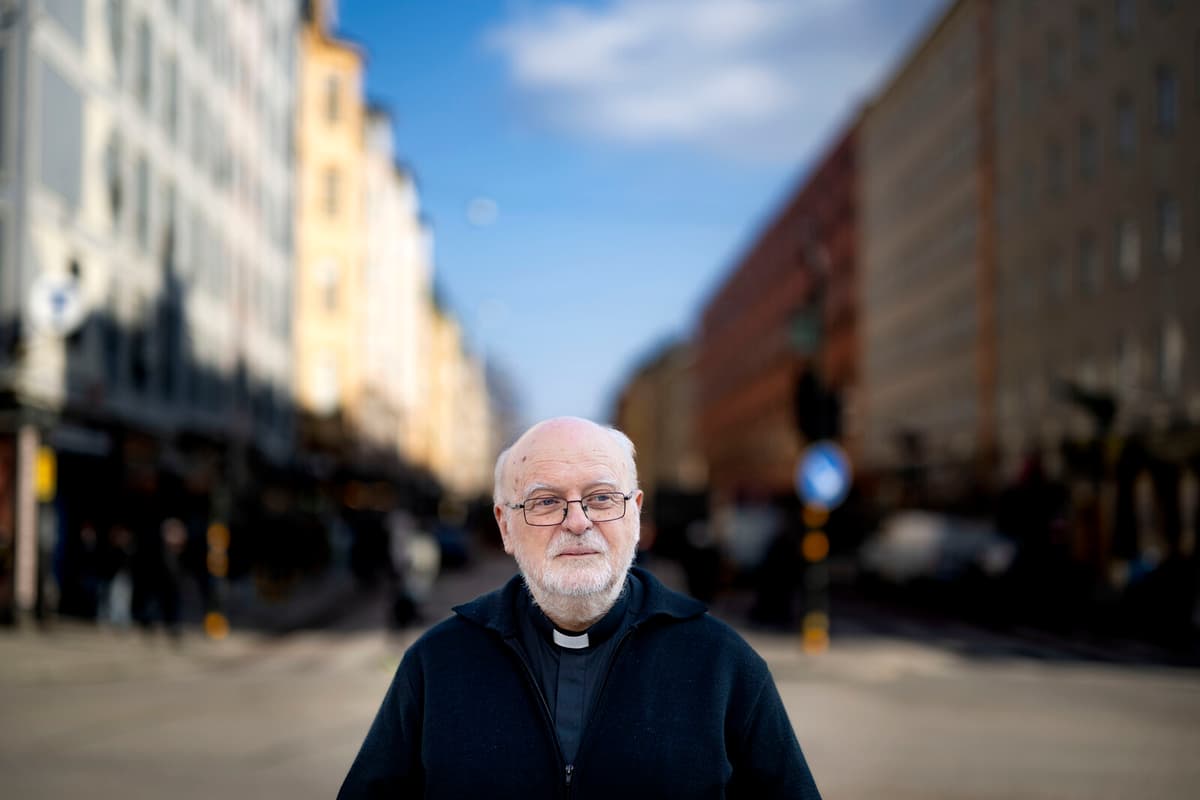Two questions are avoided when TT meets Sweden's first cardinal Anders Arborelius at the Catholic Church's diocesan office, above the classic Södermalm pub Gröne jägaren in Stockholm. The Pope's health, and Arborelius' role in a potential future conclave.
Interest in Arborelius, who in 2017 became one of the world's 252 cardinals, has increased since Pope Francis, 88 years old, was near death with double-sided pneumonia last winter.
Suddenly, parts of Sweden remembered that the French newspaper Le Figaro last year named Arborelius as one of the three cardinals who could become the new Pope. Anders Arborelius has previously said that he sees it as a lack of consideration to speculate as long as the Pope is alive – and avoids the question. When the interview takes place, the Pope has recovered.
Lacking a job description
Being a cardinal, i.e., one of those who, in the event of a papal transition, is involved in electing the next leader of the Catholic throne, he describes as "not so special".
For you never get a job description. You know that you get to vote on the Pope until you turn 80. Then you don't know much more, says the 75-year-old.
For cardinals who have full-time work in Rome, the tasks are clearer, according to Anders Arborelius. Even he is supposed to be in Rome twice a month to appoint new bishops, but "you can hardly be there so often". Much of the communication takes place instead through the mail.
The bishop is more present in the parishes in the surrounding area. In a country like Sweden, where a large part of all Catholics have a background in another country, this means a close relationship with immigrant groups. The Catholic Church has bought several properties from the Swedish Church in suburbs where many immigrants live.
The connection to this makes the Catholic Church in Sweden get in touch with problems such as gang crime, exclusion, and segregation.
Many he meets testify to an increasingly present threat of deportation, and the cardinal describes what he experiences as a radical change in society's attitude towards immigrants.
We hope that it will change a bit in this mentality, that people will become more open.
Locked positions
At the same time as the Church's view on migration can be seen as liberal, it is conservative in other respects. The issue of abortion and the right to live out one's sexuality differs from the prevailing opinion in Sweden, where the political norm advocates for the individual's right to both.
In fact, I'm surprised that there aren't discussions so often, says Anders Arborelius, and speculates that it's because most people already know that the Church's positions on the issues are "locked".
Pope Francis, who chose Anders Arborelius as a cardinal, is often seen as relatively progressive. He is against abortion, but has on several occasions expressed himself more welcomingly towards homosexuals than his predecessors.
People usually say that he is the man of surprises, says Anders Arborelius about the Pope, with whom he is in contact "now and then".
Arborelius has a similar attitude. In response to how he stands on issues of abortion and homosexuality, he answers that it is important to have a basic respect for every human being, like Pope Francis.
Then it's just that one expects the Church to give advice on how we should live, what we should do and so on. Then it's naturally always a bit different how people perceive it. But if one tries to say it more calmly and undramatically, then people can either say yes or no.
Advertisement
Swedish modesty
The Pope's openness and willingness to talk have made him a positive face outward for Catholicism, but there are those within the Church who would rather have seen a more conservative direction forward. Francis' peace-brokering position in conflicts such as Gaza and Ukraine, where he has several times expressed the need for a peace agreement, as well as his benevolent attitude towards migration, are examples of realpolitik areas where a potential successor might have different opinions about. The Italian saying "a thin Pope after a fat Pope" has made those who advocate for the Pope's approach to his surroundings fear the shift.
Several Swedish Catholics who TT has spoken to have drawn comparisons between Pope Francis and the Swedish cardinal. Both have a low-key demeanor, and a gaze turned towards the margins of both society and the Catholic throne. Anders Arborelius, however, tones down the similarities.
He has the Latin American charm, if you will. As a Swede, I don't have that, but am a bit more modest.
Anders Arborelius was born in 1949 in Switzerland, but grew up in Lund with his mother, who was a librarian.
It was through his background in Switzerland that he came into contact with Catholicism. He converted in Malmö when he was 20 years old. The year after, he entered the Carmelite monastery for monks in Norraby.
He has a master's degree in modern languages – English, Spanish, and German – from Lund University and has studied theology and philosophy in Brygge and Rome.
Pope John Paul II appointed Anders Arborelius as bishop in 1998.
In the summer of 2017, Pope Francis appointed him as a cardinal. His motto is "In Laudem Gloriae" – To God's praise and glory.
Source: Katolskakyrkan.se
The film "The Conclave": "It was interesting and well-made, but there were a few exaggerations in different directions... They took out the swings a bit too much."
Popular culture: "You follow who has won Melodifestivalen, and that Måns Zelmerlöw is disappointed."
Social media: "It's like always, for good and evil. Some discover online that there is an offer from a church and Catholic perspective. Others may discover the exact opposite." (The cardinal himself is not on social media, he says, but prefers personal contacts and visits.)






